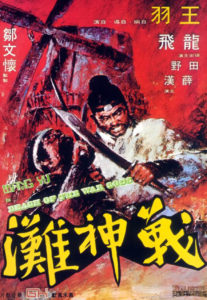Director: Jimmy Wang Yu
Cast: Jimmy Wang Yu, Lung Fei, Tin Yau, Sit Hon, Shan Mao, Choi Wang, Kwan Hung, Cheung Yee Kwai, Su Chen Ping, Hsieh Hsing, Cho Kin, Blacky Ko Sau Leung, Jack Long Sai Ga, Lui Jun, Man Man, O Yau Man
Running Time: 97 min.
By Will McGuire
There’s a delightful contradiction between form and content at the heart of Beach of the War Gods: formally the film stands as a love letter to the action cinema of Japan, particularly the work of Akira Kurosawa but all of that love is deployed in a story that is built on the pain and shame of the Japanese occupation during World War 2. It’s as if someone wrote a play in a perfect pastiche of Shakespeare’s blank verse about the Easter Rising.
There’s been a recent reappraisal of Jimmy Wang Yu in the time since I’ve been learning about Eastern cinema. When I began collecting, it was en vogue to highlight his shortcomings and personal warts and praise was handed out sparingly; as if there were a danger should he get too much. Thankfully, things seemed to have swung back in the other direction, and new attention is being paid to his merits, not just as a performer, but as a filmmaker. That’s why it’s so important to really take a deep look at Beach of the War Gods because, and I say this with all due respect to Master of the Flying Guillotine, this film is probably his most impressive work behind the camera.
Foremost, the compositions are masterful. Wang Yu likes to employ multiple layers of depth and focus to create visual interest and really utilize the widescreen format. The first act of this film really illustrates Tarantino’s observation that Wang Yu as a director seems to have gotten the closest of anyone in capturing the feel of the comic book work of the great Jack Kirby and it’s in the framing of objects in the foreground playing against objects in the background while all elements remain in focus. In the first act alone he uses this technique to establish location, to heighten visual tension, and to create a sense of voyeurism in the audience that we later learn is shared by one of the supporting characters.
There’s also a recurring sense of visual irony that feels very Japanese, or almost like a Spaghetti Western: an execution is symbolically rendered as the cutting of a cord by the man who will eventually avenge it, a coffin used as a prop for a massive trap serves its intended use when Wang Yu unceremoniously dumps an enemy commander’s body in it, the blade that kills a samurai early on is revealed to be two blades joined at the side when viewed from another angle.
The story is a condensed version of Kurosawa’s legendary Seven Samurai: a small village located adjacent to the eponymous beach is threatened by a cadre of bloodthirsty Japanese pirates who have sacked the nearest city and are heading this way. By chance, a great swordsman Xiao (Wang Yu), whose uncle was executed in defense of the city, is in the city when the news comes in and must assemble a small team of professional swordsmen to defend the town from the coming onslaught.
Wang Yu dispatches with most of the subplots and almost all the meditation of both the Japanese original and its equally magnificent Hollywood remake for a stripped down and bloody buffet of expert swordplay. Here, Wang Yu’s love for samurai films continues in the framing and editing of the fights. I found, almost immediately, visual references to everything from Throne of Blood to Kobayashi’s Hara-Kiri.
That brings us to the second half of our opening contradiction: the story is set at the height of China’s Imperial power in the early Ming Dynasty. The plot doesn’t really make sense from a historical standpoint– in the 1550’s the Ming were the most powerful state on Earth and Japan was still in the violent throes of the Sengoku civil wars that would end with the installation of the Tokugawa Shogunate. This is not a historical plot so much as it is a transposition of 20th century geopolitics into a time period where epic heroism was possible. The selfless heroism of the Chinese and abject ruthlessness of the Japanese is a reference to the Second World War and pulls into focus the martial arts film’s role as a uniquely Chinese national epic for displaced Chinese in the same way that Greek tragedy served as a rallying point for the mythic history of Athens.
Excellent direction, action, and pacing combined with fine storytelling: Beach of the War Gods is a swordplay classic that deserves the premium release its getting on Blu from Eureka. Track this one down.
Will McGuire’s Rating: 8/10




Solid effort by the Wangster. Tempted to buy the new Eureka Blu, only thing keeping me away is I hear there’s a gravure model style shoot of Mike Leeder and Arne Venema on the beach included as a special feature.
A great well-written review by Will McGuire. Makes me want to watch this.